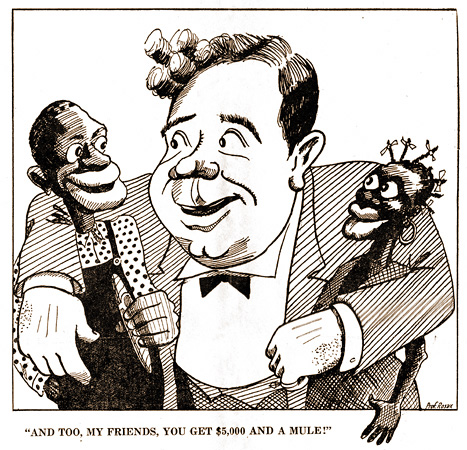Unlike many presidents who came from the established elite political class, Long was born and raised in the impoverished Winn Parish in Louisiana. Even since he was young, he was known for being outspoken and audacious. He was an avid reader and debater with a flurry of opinions he wasn't afraid to express. When 12th grade was added to the high school curriculum, he made and distributed a pamphlet decrying the additional year. Unsurprisingly, he was expelled and never returned to high school. Normally, people would start listening to authorities after such a punishment, but Long instead circulated a successful petition calling for the principal to be fired.
His expulsion didn't affect his political career or define his level of success, as 17 years later, Long would run for governor. It was the sweltering Louisiana summer of 1927, and he stood atop a cotton bale, his captivating voice booming across the vast area of dusty country fairground. He craved the spotlight, and his dominating ego prevented him from sharing it with anyone. Long won the election, and his crass, fiery oratory and attacks on Standard Oil made him a nationally famous. His political slogan, "Every man a king," landed him the nickname "Kingfish."
Long loved to insult his adversaries, calling them "vile and slanderous men," "thieves and money-hoodlers," and "bugs and lice." His favorite way to discredit his opponents was to claim they were of black descent, so although he portrayed himself as a champion of more rights for all of the working class, his reform efforts often did not extend to the black community. Despite his blatant discrimination based on race, Long was a hero to the African Americans, who loved him because his programs helped them immensely.
 |
| In this cartoon, Long was criticized repealing the poll tax and creating programs supporting public education, healthcare, and the ability to vote free of charge (though a majority were still blocked from voting) for the black community in Louisiana. |
Having always wanted to become president, Long even wrote a book called My First Days in the White House, which was published posthumously. Long had already made calculated assaults on his political adversaries when running for senator and governor, and as a presidential candidate, he would do the same. He had already planned to go against Roosevelt and split the vote for the Democrats, resulting in the victory of an extremely conservative Republican. He would then run again and win after that Republican president failed to gain the favor of citizens. Before he could execute his plan, however, he was assassinated by the son-in-law of his political rival Judge Benjamin Pavy, who Long had previously humiliated by reviving a rumor about black children in the Pavy family, thus stripping Pavy of his occupation in the state legislature.
Many of Long's observers regard him as a totalitarian dictator with an insatiable lust for power, but others commend him for improving Louisiana’s education system, infrastructure, and healthcare for all, regardless of race. Although whether Long was in fact a demagogue can be contended, it is indisputable that all of Long's efforts championed the rights of the common man.
Sources:
https://www.history.com/topics/crime/huey-long
https://www.britannica.com/biography/Huey-Long-American-politician
https://www.hueylong.com/perspectives/huey-long-quotes.php
https://www.nytimes.com/2006/04/16/books/chapters/kingfish.html
https://www.hueylong.com/perspectives/politics-racism.php
I really love this post! The added detail about his high school protest and subsequent expulsion really helps show his character as a fighter even from a young age. After doing some research, I found that there were many rumors of assassination attempts on him, yet 200,000 mourners came to Louisiana to pay respects after he was finally assassinated. he was an interesting figure because he was both so loved and so hated.
ReplyDeletehttps://www.hueylong.com/life-times/assassination.php
I thought your post had a lot of good information! I wasn't sure who General Douglas MacArthur was so I looked him up. He's known for being "proud and egotistical" and a "shameless self-promoter", but he was also an achieved pioneer of air-land-sea battle. He was the general who put down the Bonus Army so violently, and he played a role in WWII. As with Long, FDR recognized that MacArthur's personality could be dangerous if he gained too much power.
ReplyDeletehttps://www.washingtonpost.com/opinions/the-most-dangerous-man-in-america-the-making-of-douglas-macarthur-by-mark-perry/2014/03/28/74aa68e4-b049-11e3-a49e-76adc9210f19_story.html